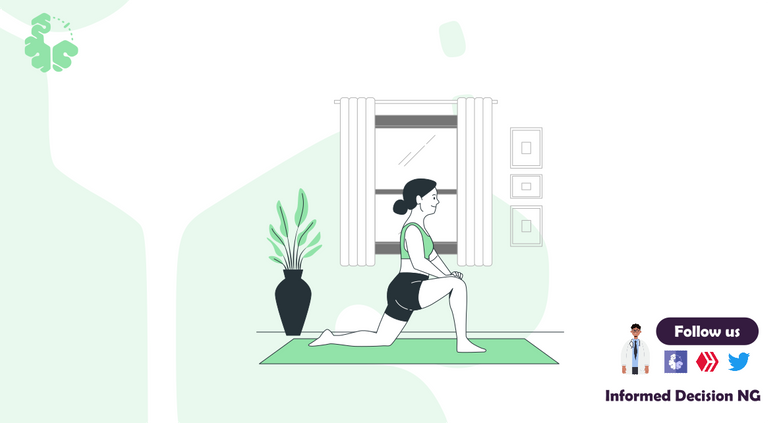Exercise as First-Line Therapy for Mental Health Problems: New Study Findings

Home illustrations by Storyset
I recently came across this profile on TikTok. He seems to be a fitness influencer, but he is not exactly the conventional kind. I could tell that there was something about the guy; he is not shredded like all the other influencers try to be. He lifts heavy and was able to take off noticeable weight from his body.
Additionally, he gives advice in general about getting finances in check, getting your life in check, and changing your mindset around life as a whole.
In one of his recent posts, he discusses how he started contemplating suicide as a teenager who was overweight. He talked about how the thoughts started creeping up on him in very uncomfortable posts. But I watched it to the end where he reveals that focusing on fitness changed his life.
I came across a post in the past that explained that exercise was just as effective as antidepressants. I never thought much of it, even if the person saying it was a licensed psychiatrist, but my recent search on Google took me to a Medical News Today post that shows that exercise was more effective than Cognitive Behavioral Therapy and Exercise.
In this post, I want to go deeper than the surface of all this information with you so that we can make informed decisions together.
New Study Findings

Presentation illustrations by Storyset
The BJM Sports Medicine recently published a new report stating that exercise appears to be more effective for conditions such as anxiety and depression (two of the most common mental health problems) and that exercise may be more beneficial to the patient than standard psychotherapy or medication.
You would think that with a big publication like Medical News Today, there would be care about the effects a publication like this can have if taken to the public, but they are not the only ones endorsing it.
In a matter of months, you will start seeing blog posts and YouTube videos here and there talking about this same thing...I say days as mine comes out now.
As much as it seems like groundbreaking information, it seems that the medical community has played a trick on the world. This is not the first time that it has been stated that there are mental health benefits of exercising.
BMJ Sports Medicine explained that they analyzed 97 study reviews that included 1,039 randomized control trials (where participants are randomly put into groups) and involved 128,119 participants.
In this study, they looked at different forms of exercise, varying the intensity and duration, and they had different population subgroups, comparing them with those who were not exposed to exercise.
What researchers found was that there were mental health benefits for every form of exercise, but particularly shorter, high-intensity exercise programs had the best results.
The benefits of the exercise were less as the exercise duration increased, showing that high-intensity exercise had the highest therapeutic benefit.
The Results

Education illustrations by Storyset
What was found was that there was a significant reduction in mental health problems for those who participated in exercises. The results were profound, a mean reduction in mental health issues that ranged from 42% to 60%, while there was only a 22% to 37% improvement.
The new recommendation from doctors involved in this study is that exercise should be included as the first-line therapy for mental health problems.
Imagine that? How many people could have been saved from suicide if they knew they could have done pushups?
What about everyone who has said that exercise cured their depression and was shouted down at?
The Future

Home illustrations by Storyset
The beauty of all this is that this is just the beginning. The world is evolving, and we will soon see the results of including exercise as a form of treatment in anxiety and depression.
With these conditions treated with exercise, would it be possible that we will see a time when they will be taken out of the Diagnostic and Statistical Manual for Mental Health Conditions? Who knows?
What I know is that the medical community has a lot of apologizing to do, but we won't because that is not our modus operandi. The American Heart Association dropped the news about cholesterol not playing a part in heart disease away from the ears of the public, and now this vital information was posted in medical jargon, so no one would be able to read it.
The future may come with a lot of distrust in the medical community if we keep this up, and soon alternative forms of medicine will be considered. Well, that won't be in the near future anyway.
Are you struggling to start your workout? Do you have any issues you want to talk about?
Conclusion
To conclude, the new study published by BMJ Sports Medicine shows that exercise appears to be more effective for conditions such as anxiety and depression than standard psychotherapy or medication.
The study analyzed 97 review studies and involved 128,119 participants, showing that there were significant mental health benefits for every form of exercise, but particularly shorter, high-intensity exercise programs had the best results.
The study found that exercise had a mean reduction in mental health issues ranging from 42% to 60%, while there was only a 22% to 37% improvement with other treatments. Doctors involved in the study now recommend that exercise should be included as the first-line therapy for mental health problems.
This information is groundbreaking, and the world is evolving, and we will soon see the results of including exercise as a form of treatment in anxiety and depression.
The future may come with a lot of distrust in the medical community if vital information is kept away from the public, but we can change that by spreading the word and making informed decisions together.
Have you ever experienced mental health problems? If so, what types of treatments have you tried, and have you ever tried exercise as a therapy?
How important do you think it is to include exercise as a first-line therapy for mental health problems? Have you ever heard of high-intensity exercise programs as a therapy for mental health problems before reading this post?
Do you think alternative forms of medicine could become more popular in the future if the medical community keeps withholding or downplaying important information?
What are your thoughts on fitness influencers who focus on mental health and wellness in addition to physical fitness? Do you think their messages are more valuable than those of conventional fitness influencers who focus solely on appearance?

Thanks for your contribution to the STEMsocial community. Feel free to join us on discord to get to know the rest of us!
Please consider delegating to the @stemsocial account (85% of the curation rewards are returned).
You may also include @stemsocial as a beneficiary of the rewards of this post to get a stronger support.